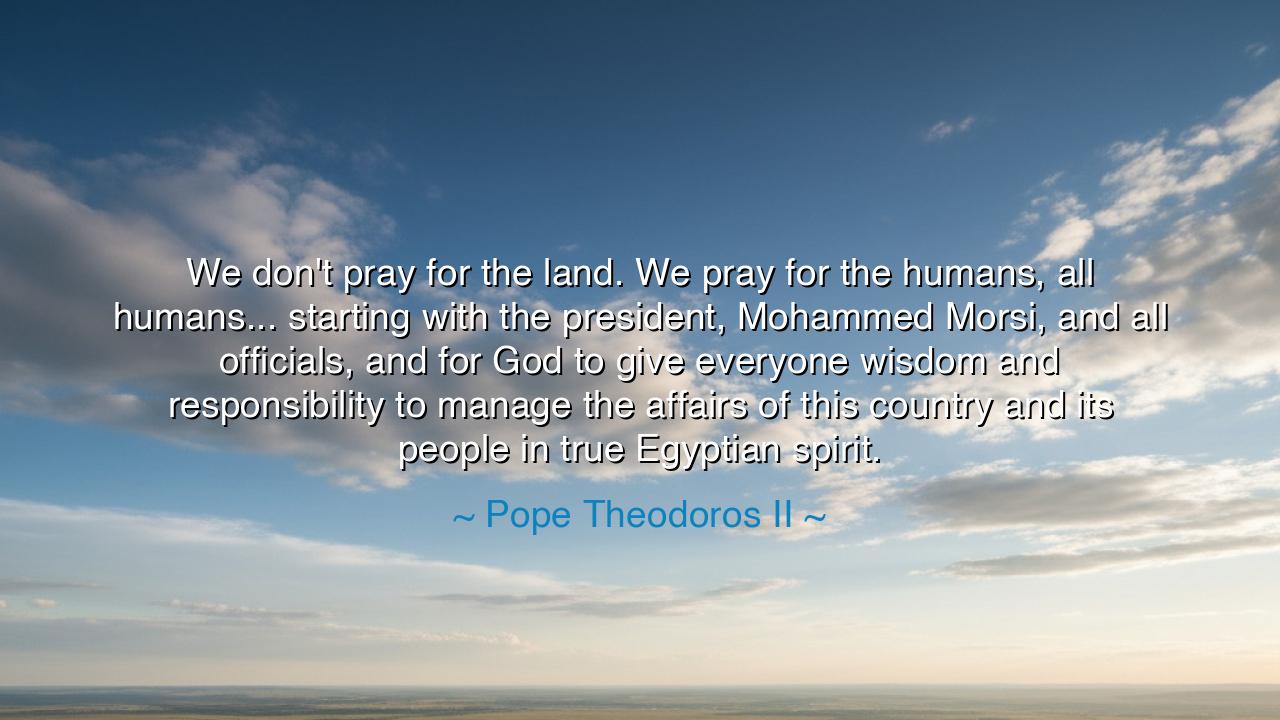
We don't pray for the land. We pray for the humans, all
We don't pray for the land. We pray for the humans, all humans... starting with the president, Mohammed Morsi, and all officials, and for God to give everyone wisdom and responsibility to manage the affairs of this country and its people in true Egyptian spirit.






The words of Pope Theodoros II fall with the weight of shepherd’s care: “We don’t pray for the land. We pray for the humans, all humans… starting with the president, Mohammed Morsi, and all officials, and for God to give everyone wisdom and responsibility to manage the affairs of this country and its people in true Egyptian spirit.” In this statement, he reminds us that nations are not defined by soil or stone, but by the lives of the people who dwell upon them. The earth may endure, but it is the human soul that needs prayer, guidance, and redemption.
To pray for the land alone is to bless fields and rivers, yet leave unattended the hearts that govern and labor upon them. Pope Theodoros lifts the vision higher, teaching that true prosperity flows from humans shaped by conscience, leaders infused with wisdom, and citizens bound by responsibility. Without such virtues, the land, however rich, becomes barren of peace. With them, even deserts may bloom.
The reference to President Mohammed Morsi and the officials of Egypt speaks to a time of great turmoil in the nation’s history. In the years after revolution, when distrust and division clouded the land, Pope Theodoros sought not to curse rulers nor exalt factions, but to call upon heaven for guidance. His prayer was for the unity of the people under the eternal banner of justice and the Egyptian spirit, a spirit forged by millennia of endurance and faith.
History echoes this wisdom. When Solomon prayed at the dedication of the Temple, he did not ask for gold or conquest, but for an understanding heart to govern his people. His story, like that of Theodoros, reveals that nations are secured not by armies or wealth, but by the righteousness and responsibility of those who lead and those who follow. Thus, the call to pray for leaders—even those with whom one may disagree—is both an act of humility and an acknowledgment of shared destiny.
Therefore, let this truth endure: the land is but dust without the souls who shape its destiny. Pray not only for harvests, but for hearts; not only for fields, but for those entrusted with their care. Pope Theodoros II teaches that true strength comes when a people, in unity, lift up their leaders and themselves in prayer for wisdom, that their nation may be governed in justice, and their spirit remain unbroken.






TTduy thai tran
This perspective feels both spiritual and pragmatic. By praying for wisdom and responsibility, he acknowledges that human choices shape a nation more than divine intervention alone. But I wonder, does this approach risk overlooking systemic problems that require concrete action, not just prayer? Maybe the true power lies in combining faith with civic engagement—praying for leaders, but also holding them accountable to their people.
NYNhu Yy
I find it interesting that he chooses to pray for people, not land. It suggests that a nation’s well-being depends more on moral leadership than on physical territory. But I can’t help but ask—how does one measure when such prayers are answered? Do spiritual intentions translate into real political change, or do they serve more to comfort and guide individuals amid turmoil?
VTle van toan
This quote feels like a reminder that religion, at its best, should unite rather than divide. I’m intrigued by his emphasis on wisdom and responsibility over ideology. It makes me think—can faith act as a moral compass in governance without turning political? The balance between spiritual values and political realities seems so delicate, especially in a country with such complex religious and cultural dynamics.
KH6.Nguyen Khac Hieu
What stands out here is the idea that patriotism isn’t about geography but about shared humanity and moral integrity. I find that deeply compassionate, yet also challenging. In moments of political anger or injustice, how do we continue to pray for those in power sincerely? It takes a kind of forgiveness and humility that’s not easy to practice. Maybe that’s what spiritual maturity truly looks like.
GDGold D.dragon
This statement really moves me because it shifts the focus of prayer from land and politics to people and moral responsibility. It makes me wonder—does true national healing begin not with changing systems, but with transforming hearts? I find it powerful that he prays even for leaders, especially in times of division. Still, I wonder how realistic it is to rely on spiritual unity in a politically fractured society.